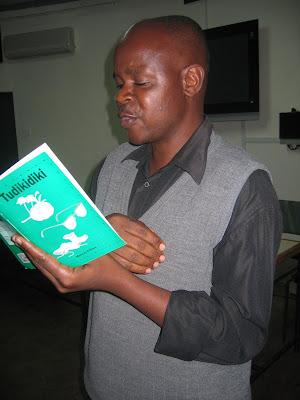Kangira Reviews Chirere's Tudikidiki
Dr. Jairos Kangira of Namibia Polytechnic has written a capitivating review of Memory Chirere's Tudikidiki, a collection of short stories. You can find the full text of the review in The Herald.
Excerpt:
New year present from Chirere!
Reviewed by Dr Jairos Kangira MEMORY Chirere’s second book — Tudikidiki — is a New Year’s present.
Reason: save for the multi-authored collections by Zimbabwean Women Writers, the short story in the Shona language is almost non-existent.
The poem and novel heavily dominate the space and yet the short story in English is on a massive rise in Zimbabwe.
Tudikidiki is heavily influenced by Chirere’s first book, a collection of short stories in English called Somewhere In This Country.
Here as in the first book, the stories are short. Reading, you remember Flannery O’Connor: A story is a way to say something that can’t be said any other way and it takes every word in the story to say what the meaning is.
 Chirere reading from Tudikidiki at the African Drums Festival in Harare (December 2007).
Chirere reading from Tudikidiki at the African Drums Festival in Harare (December 2007).
Memory Chirere is a writer to watch.
Another excerpt:
Chirere’s wit is honey coupled up with grit and the conversations are dreamlike and childlike.
As Ignatius Mabasa warns in the introduction to this book, most of these stories are not for children, but are about children. Yet you come away feeling that the word "children" is more complex than meets the eye.
The struggles in life bring out the most basic instincts, making us all children.
Chirere is at his best with stories with subterranean meanings and you might be caught reading and re-reading these stories for their various levels of meaning and wit.
I have come across this in the few stories of Langston Hughes.
Excerpt:
New year present from Chirere!
Reviewed by Dr Jairos Kangira MEMORY Chirere’s second book — Tudikidiki — is a New Year’s present.
Reason: save for the multi-authored collections by Zimbabwean Women Writers, the short story in the Shona language is almost non-existent.
The poem and novel heavily dominate the space and yet the short story in English is on a massive rise in Zimbabwe.
Tudikidiki is heavily influenced by Chirere’s first book, a collection of short stories in English called Somewhere In This Country.
Here as in the first book, the stories are short. Reading, you remember Flannery O’Connor: A story is a way to say something that can’t be said any other way and it takes every word in the story to say what the meaning is.
 Chirere reading from Tudikidiki at the African Drums Festival in Harare (December 2007).
Chirere reading from Tudikidiki at the African Drums Festival in Harare (December 2007). Memory Chirere is a writer to watch.
Another excerpt:
Chirere’s wit is honey coupled up with grit and the conversations are dreamlike and childlike.
As Ignatius Mabasa warns in the introduction to this book, most of these stories are not for children, but are about children. Yet you come away feeling that the word "children" is more complex than meets the eye.
The struggles in life bring out the most basic instincts, making us all children.
Chirere is at his best with stories with subterranean meanings and you might be caught reading and re-reading these stories for their various levels of meaning and wit.
I have come across this in the few stories of Langston Hughes.
Comments